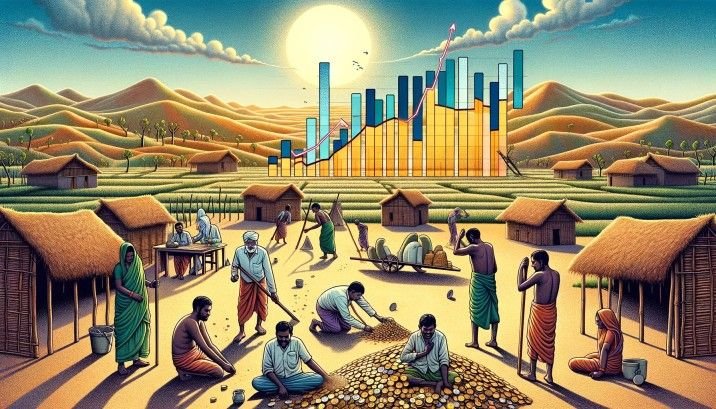In Madhya Pradesh (MP), a state in central India, rural workers are facing a severe crisis: their daily wages are significantly lower than the national average. This blog aims to shed light on this critical issue, drawing upon recent data and reports.
Non-Agricultural and Construction Workers The scenario is equally grim for non-agricultural workers in MP, who earn an average daily wage of ₹246.3, again below the national average of ₹348. Construction workers in MP fare slightly better but are still below the national average, earning ₹278.7 per day compared to the national average of ₹393.3. The wage crisis in MP is influenced by several factors: Agriculture Dependence: The rural economy in MP heavily depends on agriculture, which is subject to monsoon variability and production cycles of rabi and kharif crops. Extreme Weather Events: The increasing frequency of extreme weather events impacts agricultural productivity, further depressing wages. Implications Economic Strain: Low wages result in diminished purchasing power, exacerbating poverty and hindering economic development. Social Impact: This wage disparity can lead to increased social inequality and unrest, as rural workers struggle to meet basic needs.
Policy Recommendations Wage Revision: There is a pressing need for the government to revise wage rates, especially under schemes like MGNREGA, to provide relief to these workers. Diversification: Encouraging non-agricultural employment and diversifying income sources can reduce dependence on agriculture. Infrastructure Development: Investment in rural infrastructure can create more job opportunities and enhance productivity. Climate Resilience: Building climate-resilient agricultural practices can mitigate the impact of extreme weather on crop yields and wages.
The situation of rural workers in Madhya Pradesh is a glaring example of the wage disparities in India. Addressing this issue requires a multi-faceted approach, involving policy intervention, economic diversification, and infrastructure development. It is crucial for the state and national governments to recognize and act upon this crisis to ensure a fair and equitable economic growth for all its citizens.
